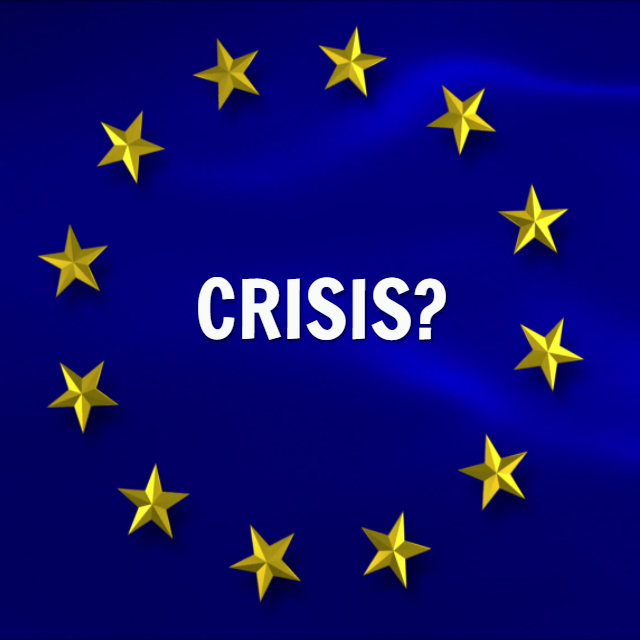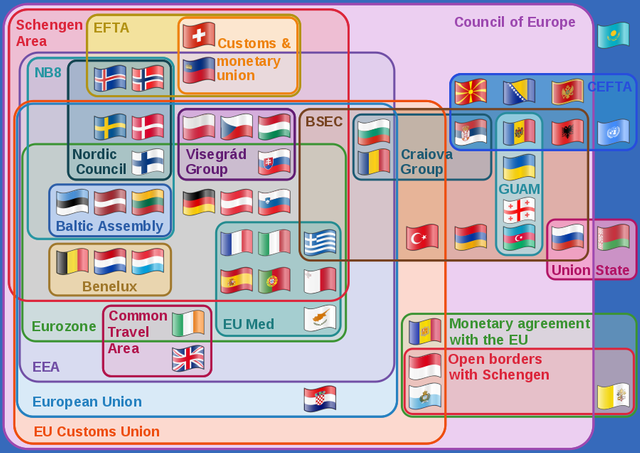European Union on Brink of Collapse: Can Cryptocurrency Save The Day?
Restatement of the Topic
As the European Union faces uncertainty, can crypto currency and blockchain save the day?
Introduction
This post is meant to analyze the economic ramifications of European geopolitics without getting bogged down in the philosophy of the politics themselves. I will not express my own political opinions. Instead I will analyze events and form a forecast of how these events will affect and be affected by cryptocurrency. The rise of anti-globalist populism throughout Europe has been highlighted by Brexit, the Italian referendum, as well as several other crucial national elections, including the upcoming election in France this weekend. Regardless of election results many of the underlying problems fueling anti EU sentiment are not being addressed and they will continue to fester. The Eurozone is looking increasingly fragile as nation by nation, political movements emerge to leave the EU. Compounding this uncertainty are the massive amounts of debt and financial strains left over from the largely unresolved Euro Banking Crisis. Perhaps the best example of this is the current situation in Greece and the tension they have with the ECB, more specifically Germany.
An increasing amount of evidence suggests no end in sight for the turmoil in the Eurozone, as it faces arguably it’s greatest challenge yet.
Greek Bonds due - July 20
Discussion
Before we can make forecasts about crypto currency we must first have a basic understanding of the European situation.
The population of the EU is 508 million inhabitants, making it the third largest population in the world.
“Internally, the 28 EU member states have adopted the framework of a single market with free movement of goods, services and capital. Internationally, the EU aims to bolster Europe's trade position and its political and economic weight.”
Of these 28 nations 19 use the Euro as a national currency
“The euro (sign: €; code: EUR) is the official currency of the eurozone, which consists of 19 of the 28 member states of the European Union: Austria, Belgium, Cyprus, Estonia, Finland, France, Germany, Greece, Ireland, Italy, Latvia, Lithuania, Luxembourg, Malta, the Netherlands, Portugal, Slovakia, Slovenia, and Spain.”
The nations themselves have very little control over monetary policy.
“The euro is managed and administered by the Frankfurt-based European Central Bank (ECB) and the Eurosystem (composed of the central banks of the eurozone countries). As an independent central bank, the ECB has sole authority to set monetary policy. The Eurosystem participates in the printing, minting and distribution of notes and coins in all member states, and the operation of the eurozone payment systems.”
The economic impact of Brexit will be softened by the fact Great Britain never adopted the Euro. Other nations seeking national referendums on a European exit will not have that luxury.
Already Marine Le Pen has called for a return to the Franc. There has also been serious discussion about a return to the Lira in Italy as well as the Drachma in Greece.
What Does this mean for Cryptocurrency?
I want you to take a moment…to imagine this scenario…
Great Britain successfully leaves the European Union, several other nations follow suit. National currencies are restored at a substantial reduction of purchasing power. The Euro is put under tremendous pressure and is rapidly losing confidence. 508 million people are now unsure if they can trust their government or currency.
Do you think a few of these people may look towards crypto currency to ensure their financial future?
I am not naive and know that most people still are unaware of crypto currency. I was able to have a discussion with fellow Steemian @edje who lives in Amsterdam. I asked him about his experience in regards to the public's understanding of cryptocurrency.
“In my circle of friends, almost nobody discusses this. I have some friends in the age group of 20-30yrs who know about Bitcoin more than just: "oh that is what criminals use, right?". I know of one friend who has Bitcoins. But most of my friends find crypto currency something that they heard of on TV/News, but complex and don't look at it all. The older generation: 35 and older, don't really talk about this; and our parents and grandparent in age group 60+ really do not talk about this at all! The news talks about Bitcoin, but mainly when something big happens, when lots of Bitcoins get stolen (like a couple of years ago), when Bitcoin jumps 100%+ in price level, when Darknet is discussed around topics of Silk Road closed down and so on, generally when something negative happens.”
I have had similar experiences, talking to European family and friends. While many will not look to crypto, I think a Euro crisis would qualify as “something big” immediately putting more emphasis on crypto for the average person.
What are the effects of even a small percentage of the 508 million rushing into crypto?
Even countries that do not use the Euro will be affected by the fracturing.
The Euro is economically intertwined with countries around the globe.
It Is my belief that cryptocurrency will be thrown into the spotlight in Europe as the political/ financial turmoil continues. This is one of the reasons I believe Bitcoin’s scalability debate needs to be settled sooner than later.
Why is it logical for Europeans to move towards Cryptocurrency?
One of the benefits of living in or traveling through the EU is the ability to use your currency in 19 nations. This ease of travel and payment has created a culture that is used to a single currency.
Enter crypto…. cryptocurrency does not know borderlines or have a central bank. It maintains the benefits of universality and ease while removing the drawbacks of central control and government incompetence.
Europeans have also been subject to “Bail ins” in which their bank savings were stolen by the government.
Cryptocurrency bank skeptic Europeans, can become their own bank and store their BTC for example in a hardware or paper wallet.
Many Europeans understand the danger of having a third party between you and your assets.
Conclusion
It is likely that the rise in instability in the European Union will also mark a rise in the interest of crypto currencies in the region.
Previously victimized peoples, skeptical of the financial system will seek alternative means for protecting their wealth.
Cryptocurrency could be a beacon of hope in very uncertain times. People now have the ability to easily transition their wealth into a non-sovereign asset.
This rush into Cryptocurrencies could cause a dramatic price rise in BTC and other popular altcoins.
Cryptocurrency may become a wealth preservation tool in turbulent times.
I have had the pleasure of interacting with several new Steemians from Europe this week! Steemit is a great way to introduce people to the concept of crypto currency and learn from others.
I would encourage Steemit to reach out to our European friends and bring them into the community.
It is not so crazy to believe that someday STEEM may outlast the Euro…
If you are currently living in the EU I would love to know your thoughts!
Do you agree/ disagree with my analysis?
Do you currently use crypto currency? If so which?
Is there an increase of interest in Crypto currency because of the recent instability?
Are people concerned about their national currency/Euro?
And anything else you would like to add; all thoughts are welcome!
It is also important to note that instability in sovereign currency is not limited to the EU. There has been a great deal of turmoil in Venezuela, where the country is experiencing massive inflation. Even in my home country the United States there has been a lot of talk about currency manipulation and devaluation.
If you live in Europe or have friends in Europe give this a Resteem.
Part 2 of this series will explain how blockchain could be used by governments.
(This is not financial advice)
Sources
https://en.wikipedia.org/wiki/Euro
https://www.cia.gov/library/publications/the-world-factbook/geos/ee.html





When crypto becomes bigger, countries central banks and financial watchdogs and tax agencies will make crypto part of the standard procedures; ie VAT and taxes. Countries like Germany already do. Banks are now looking into crypto as well; some consortia already emerged. What they exactly will do with crypto, that is the question. The complexity to handle crypto is still too complex for most of us. Also the easiness to transfer money to a wrong address is to big and there is no organsiation to help those people resolve the issue; With wrong transfers through banks, the sender may not get its money vmback as well, but at least the bank is there to support the process. A lot need to be done still before Bitcoin or any other coin can be roller out for the group just following the crypto lovers, the innovators who dare to taken a little risk.
I agree, education and utility are still the biggest barriers of entry for the average person.
Having control over your own "money" does increase the risk in a sense. It puts more responsibility on the individual to take the proper precautions and procedures to protect their assets.
Crypto does however mitigate the risk from bad monetary policy IMO. There is also no way for people to get their money back from a bail in by the government or banks. Ultimately things will change when people perceive it to be more risky to hold national currency than crypto. That is not a given though, in my opinion I believe there is high likelihood that happens, but I could be wrong.
Here are two interviews with Andreas Antonopoulos, He is Greek and has an interesting perspective about banking and BTC. He discusses how his Greek mother moved her savings into Bitcoin, inorder to save her pension from being confiscated by the gov.
I do not rule out the dominance of crypto currency at some point in time, it is not a simple taks though to reach and it'll probably take many years to come before a relevant group is using crypto in their mix of currencies to pay for goods and services. To get to a point where eg 10% of the population in a community is using 1 or more altcoins for eg 20% of their expenses, many things still needs to be solved; The user experience shall be super super simple; User interfaces shall be super super simple; Crypto volatility needs to be under control. I can name many other requirements that needs to be solved before crypto can increase usage and marketshare to com even close to the aforementioned case: 10% of the community is using 1 or more altcoins for 20% of their expenses. This will likely take 10 to more years, unless some startup company creates a very cleaver model; None of what is on the market today is even close to solving the real issues. I have some ideas how to bring crypto into the general household, this requires quite a bit of financial investments into super simple user experience ie creative and technology and operations, proposition, marketing and sales.
BTW, that are real long videos. I hope I have some time this weekend to watch them (a shame Steemit UI does not have a bookmark function).
Yeah I know they are long. Worth it to watch though! Bookmark function, something I have been thinking about lately as well.
"Necessity is the mother of invention" I believe the integration could happen much more quickly if there is a real need for an alternative due to failures in our current monetary system, that is essentially the point of the article.
I would definitely like to hear more about your ideas to integrate crypto, sounds very interesting!
All the best :)
I have several 'bookmark' methods; one of them is send URL to your own ID on Telegram :) Bookmarking in my browsers, doesn't work for me, I tend not to look at all those bookmarks. For sure I'll watch them. Wrt a quicker adoption; Will not happen! The existing institutes are to dominant; We need at least something as big as a 100% collapse of our current financial system, that may happen sooner or later, and although I somehow hope it'll be sooner, maybe it is better it collapses later. Why? Well, when the system really collapses, the Euro and $ has no value anymore, we get chaos, we get anarchy, we get many many wars on small scale, especially in the western world. From the ashes, people may rise up that may create an even worse system than we already have. Better to go slow and change the system by introducing a new system in small steps. Human nature is to stick to what they know, so 'slow' is the keyword, next to 'simplicity'.
Preach Crypto! Trying my Best
You are doing a great job!
The EU is going to collapse from the failed infrastructure. There isn't anything a currency can do, but I enjoyed the bit of optimism in this read. [:
The idea is not for crypto to save the EU or Euro, but to help protect the savings and purchasing power of some of it's citizens during the transition. Thanks for reading!